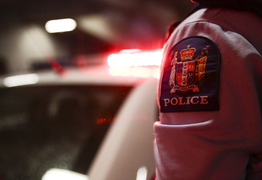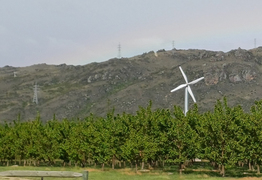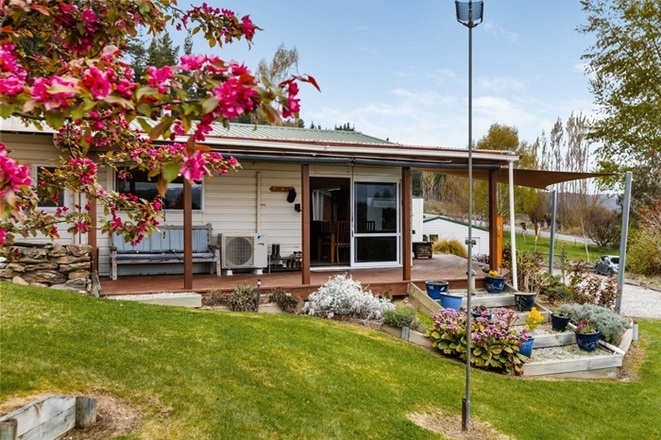The En’ Game - From Enforcement to Enjoyment… a 20-year bike ride for Chris Foggin
25 October 2024, 4:15 PM
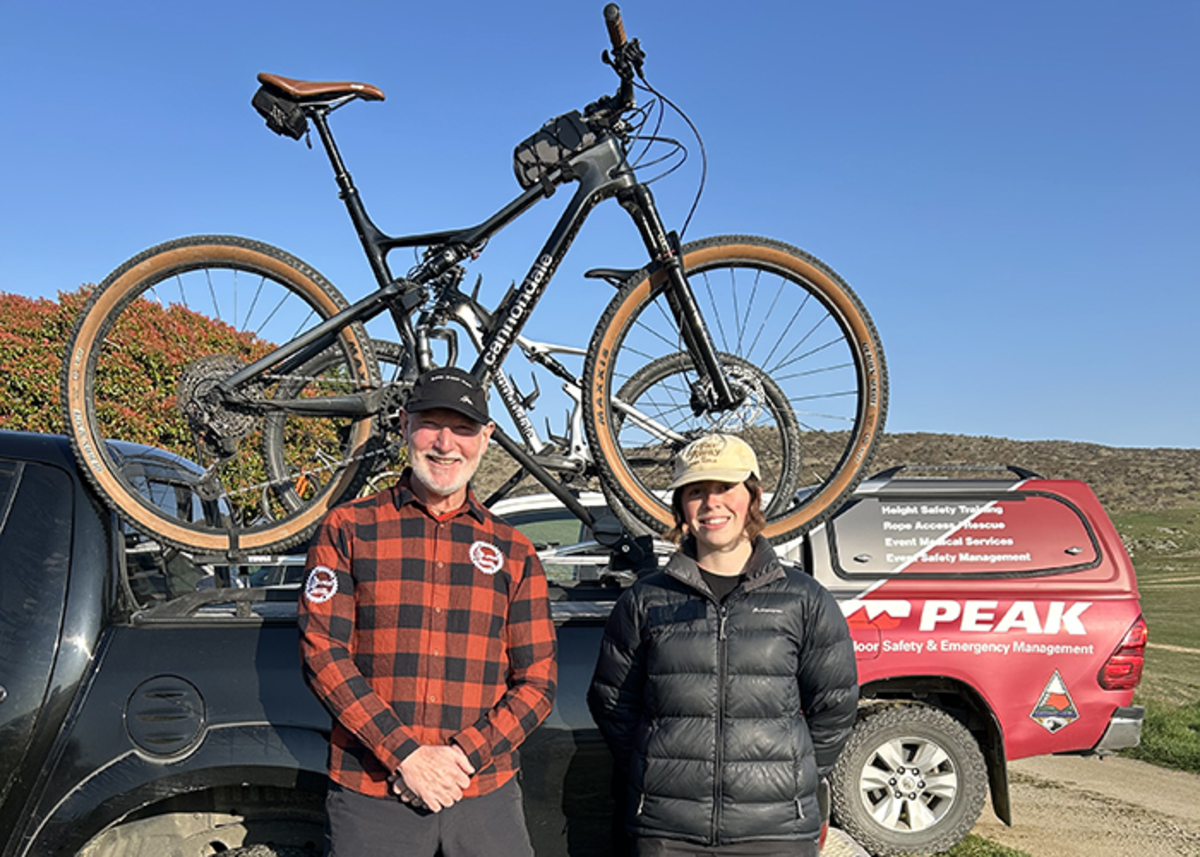 Central Otago District Council road safety advisor, and former UK "bobby on a bike'' Chris Foggin (left) with Peak Safety Outdoor Safety and Emergency Management trainer Charlie Lester-Rosson. PHOTO: SUPPLIED
Central Otago District Council road safety advisor, and former UK "bobby on a bike'' Chris Foggin (left) with Peak Safety Outdoor Safety and Emergency Management trainer Charlie Lester-Rosson. PHOTO: SUPPLIEDHave bike, will travel, with an emphasis on enjoyment and safety
There’s no doubt about it, with our cycle trails network developing, Central Otago is poised to become something of a bike capital – have bike, will travel.
And with the price of fuel, the need to stay fit for health and wellbeing and having an ever-increasing number of trails to choose from, the option of biking ticks a few boxes.
With that, there is a responsibility to encourage people to be safe on the trails and road network, and the Central Otago District Council is a strong advocate for this, having invested time and resources into it, with the help of NZTA funding for the newly developed ‘Wheels Up’ campaign.
With the first Community Bike Ambassadors course behind us, a first for Central Otago, and possibly for New Zealand, we're keen to offer another, with tentative dates set for December 7 and 14.
Meet free-wheeling Chris (Foggie) Foggin... the man behind the initiative...
Twenty years ago, I was a serving police officer in the UK.
I was responsible for a number of different specialist officer safety programmes.
A decision had been made at senior management level, that any and all operational programmes required relevant training.
One such programme was to put officers out on patrol on pedal bikes.
Police patrol bikes had always been around, but they were usually old heavy steel BSAs with three-speed Sturmey-Archer gears and dynamo lights…. not very fast or agile.
It became my job to research, design and develop a two-day police cycle patrol course, which I revelled in... my hobby and work suddenly combined.
I developed the course and content to include on-road cycling skills, urban MTB skills, patrol techniques and bike related defensive tactics; a great initiative which would enable more interaction with the public, break down barriers and assist officers to cover considerable distances through our towns and cities, often faster than the police vehicles.
We started with no gear and rubbish bikes (see pics), however we soon procured police branded bike uniform, a fleet of Marin hard tail MTBs (perfect for urban patrol) and other safety equipment.
I even had all the bike tyres lined with Kevlar tape to minimise punctures from broken glass and other objects on the rough city streets, and eventually we got the fleet painted in ‘police colours’.
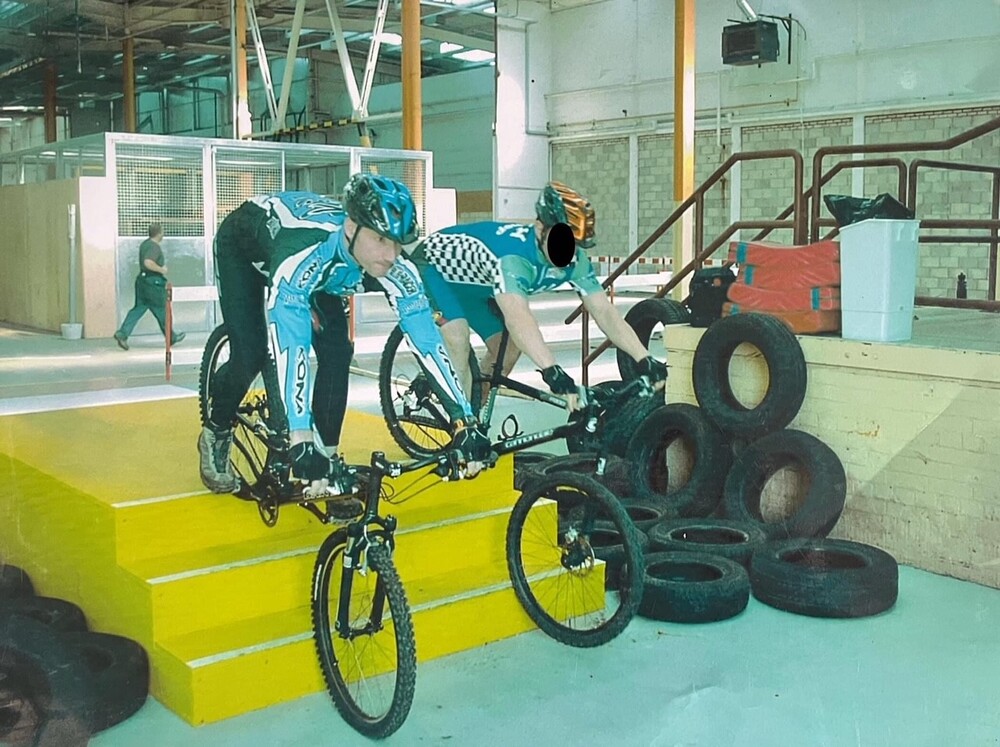
Developing bike skills for police on the ramps. PHOTO: SUPPLIED
I designed and built indoor ‘urban’ ramps, steps and obstacles in order to train in a safe environment, and away from prying eyes.
I engaged with a national MTB qualification provider to formalise a certification and subsequently trained dozens of officers and trainers. It was great fun and had huge benefits on a number of levels.
I would also frequently deploy as a cycle patrol myself, to ensure I had operational competency.
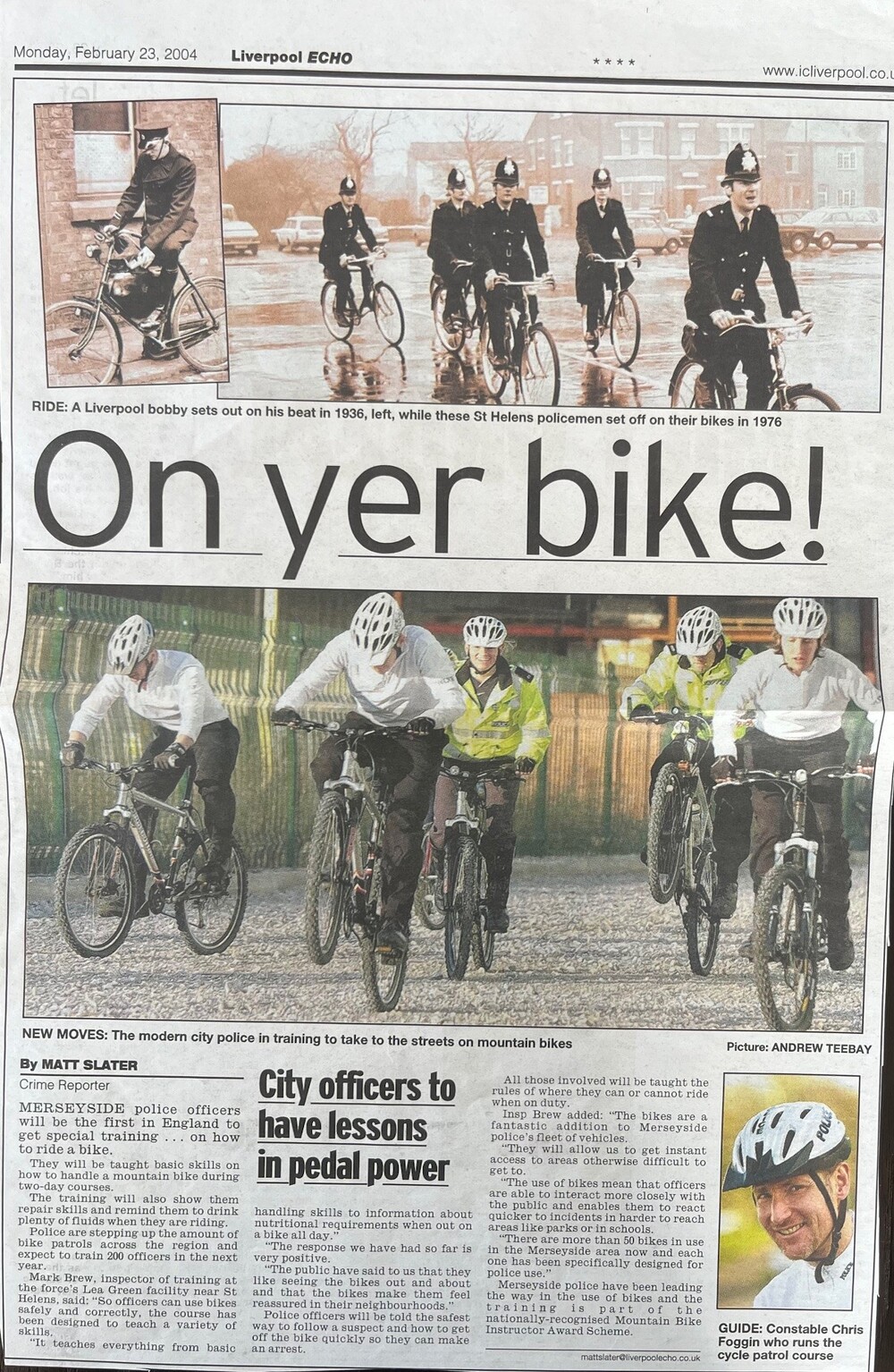
A UK newspaper article abut the cycle patrol course. PHOTO: SUPPLIED
Another upside was that the local media wrote positive articles about the subject and our patrols. The pic of me in the police branded bike helmet was taken for one of those press articles about the programme 20 plus years ago.
We were leading the way with this training and a consequence was that other police forces followed suit, and the certification became a national requirement. I was very proud of that.
Fast forward to 2011 and I had the opportunity to take up a role with Cycling New Zealand as their coach education manager.
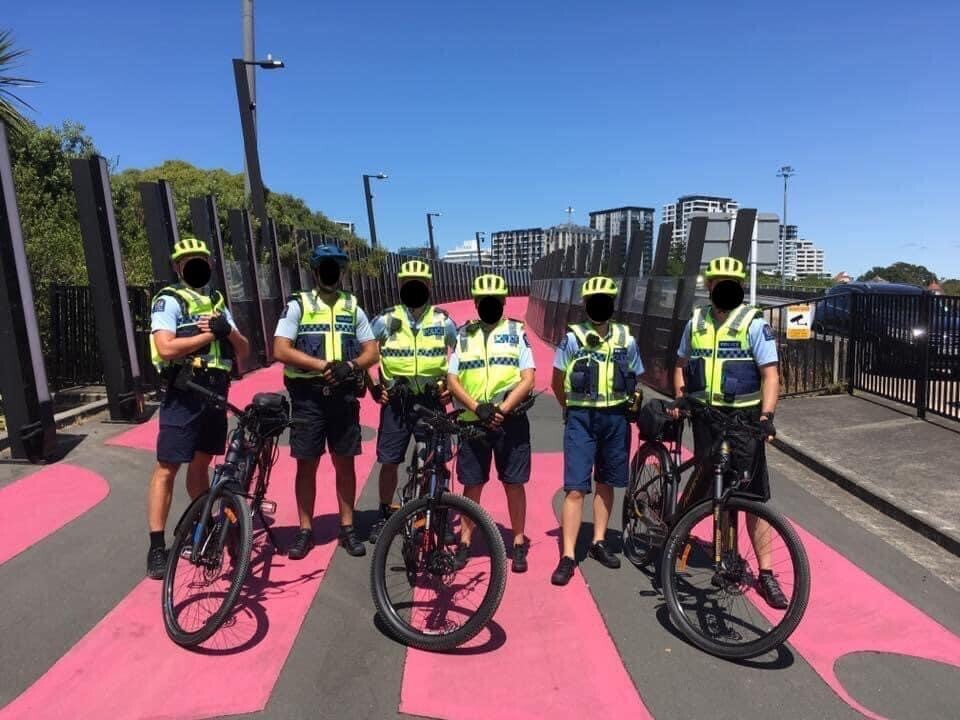
During his time with the New Zealand Police. PHOTOS: SUPPLIED
With the blend of experience and knowledge gained in this national sports body role and my previous law enforcement career, a cool thing happened in 2019 when I was asked to design and deliver a two-day training course for the New Zealand Police E-bike Trial.
Again, another great programme pretty much reflecting the content of 20 years previously, however updated for modern e-bikes and modern patrol techniques, gear and equipment.
I delivered training across NZ and up-skilled their (NZP) trainers. This was very well received by the officers involved and a very fulfilling job to do.
Other organisations, who use bikes for professional purposes, have subsequently decided to do the course to enhance staff safety with relevant training. This includes a patrol course for the City Safe team at Hamilton City Council.
Of course, some would say “it’s just like riding a bike”.
However, it isn’t, as a modicum of skill is required by the user, and the employer has a duty of care to provide relevant and suitable training.
In 2014 I represented Cycling New Zealand delivering a presentation to the Developing Mountain Biking conference in Peebles, Scotland.
I met with their volunteers who were part of their ‘Bike Patrol’ scheme. A fantastic project based on the Ski Patrol concept.
All volunteers, but well trained, and people who would just be out on the trails anyway and could help others in strife. I came back to NZ fizzing about doing the same here.
Of course, the problem was always…. who funds the training? And frequently hitting the wall - “we don’t need this training in NZ!”
Commercial bike parks such as Christchurch Adventure Park use paid bike patrols, again just like ski patrols up on the ski fields; however, there aren’t any formal or recognised bike patrol training courses available. And the word ‘patrol’ implies that there is an element of enforcement rather than enjoyment involved with this mahi.
Around 2015 myself and a colleague initiated a programme through Cycling New Zealand called ‘Ride Leader’. We had sponsorship through NZTA and the national sports body’s platform to launch from. This was a one-day course, and we delivered the programme to dozens of social riding groups across NZ.
Then, as these things do, the funding dried up and there wasn’t a desire within the leadership to keep it going. So unfortunately, ‘Ride Leader’ died a death.
Over the past five years or so I’ve been beavering away developing this training…. it’s progressed from cycle patrols, to ride leaders, to trail patrols, to cycle trail ambassadors, to our newly formed Central Otago Bike Ambassadors programme (COBA).
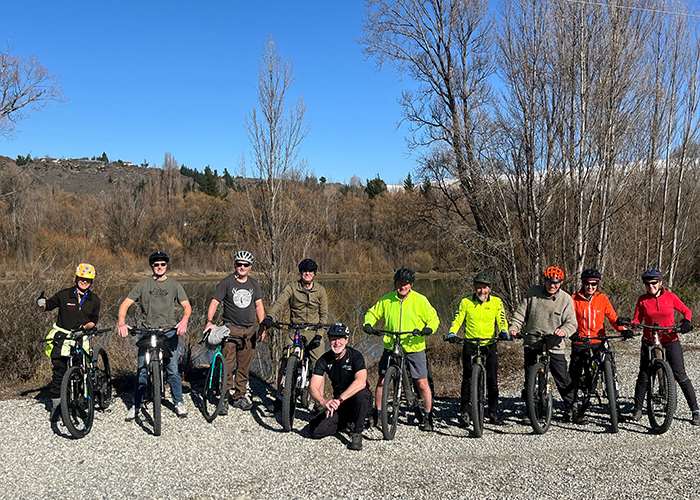
Community Bike Ambassadors during Day 2 of their recent course. PHOTIO: SUPPLIED
This iteration is a really important step for the future of bike education and enhancing good practice in our region. Assisting our community to become more cycling savvy, understanding good cycling etiquette, and having a sustainable bike education programme are keystones in the CODC ‘Wheels Up’ strategy.
Our aim is to build a critical mass of knowledgeable community members who have a consistent approach to helping others.
This includes information on good practice guidelines for riding around our trails and road network, and professional development with outdoor first aid and incident management sessions.
There are no expectations of participants beyond the course, just the fact that they will be out riding in our community with the knowledge, understanding, behaviours and skills to offer help if needed.
And after the training, they will be at a point where they could help with education programmes in schools (we have already started this mahi), or with other bike groups if they so desire.
It’s all about being recognised as a bike leader in our community.
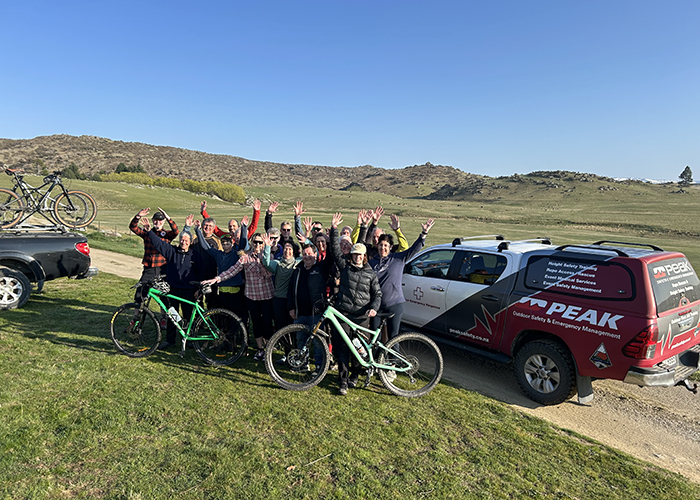
Community Bike Ambassadors during Day 3 of their recent course. PHOTO: SUPPLIED
We now have 28 keen local riders trained up which includes nine teachers spread across five schools, and I’m keen to hear from others in the community and deliver to another cohort if we get a response.
This is more than just a bike course…this is community engagement, development and safety.”
If you are interested in increasing your knowledge and sharing your love of biking with the community and visitors to the district contact Central Otago District Council road safety advisor [email protected]
NEWS
